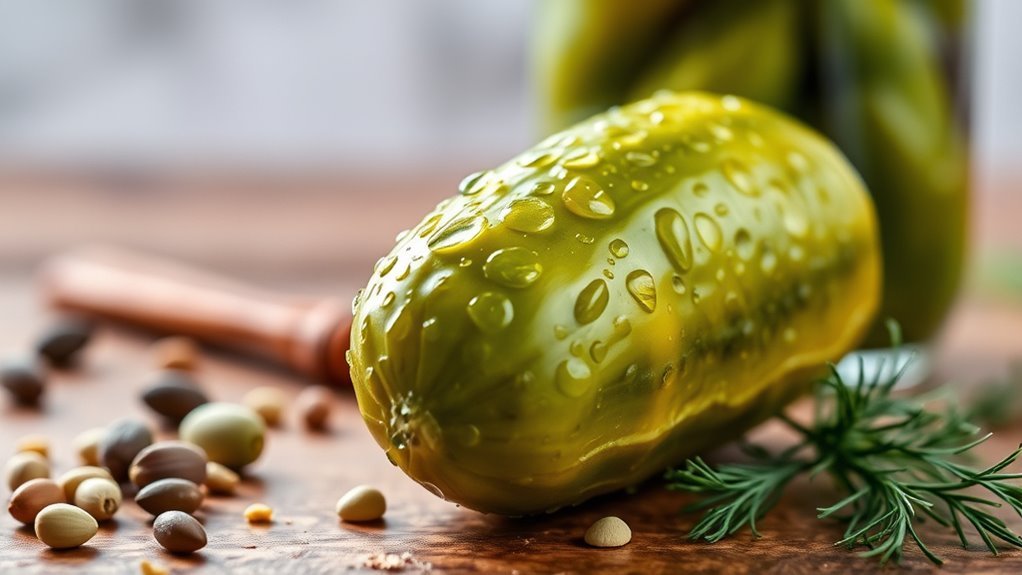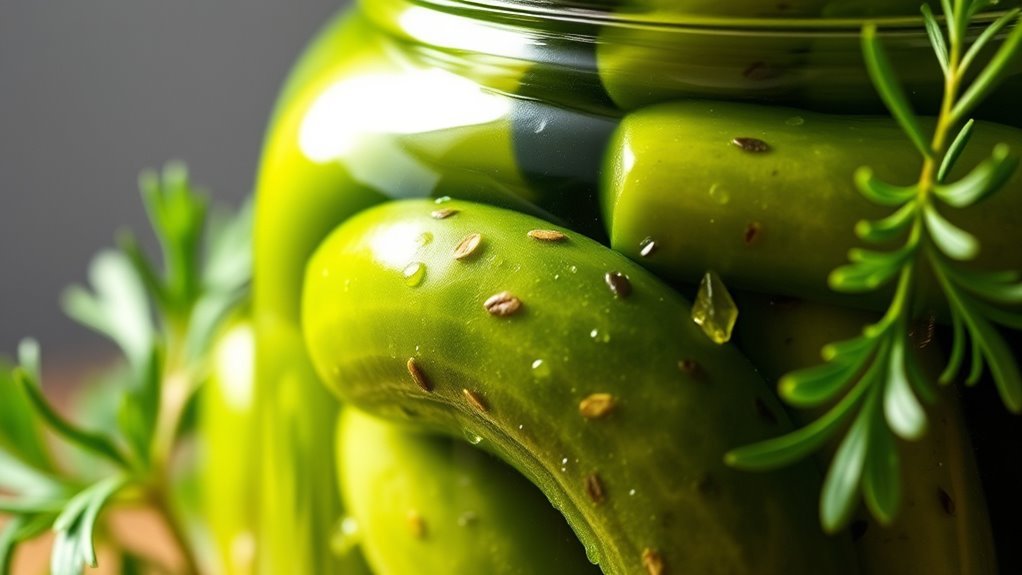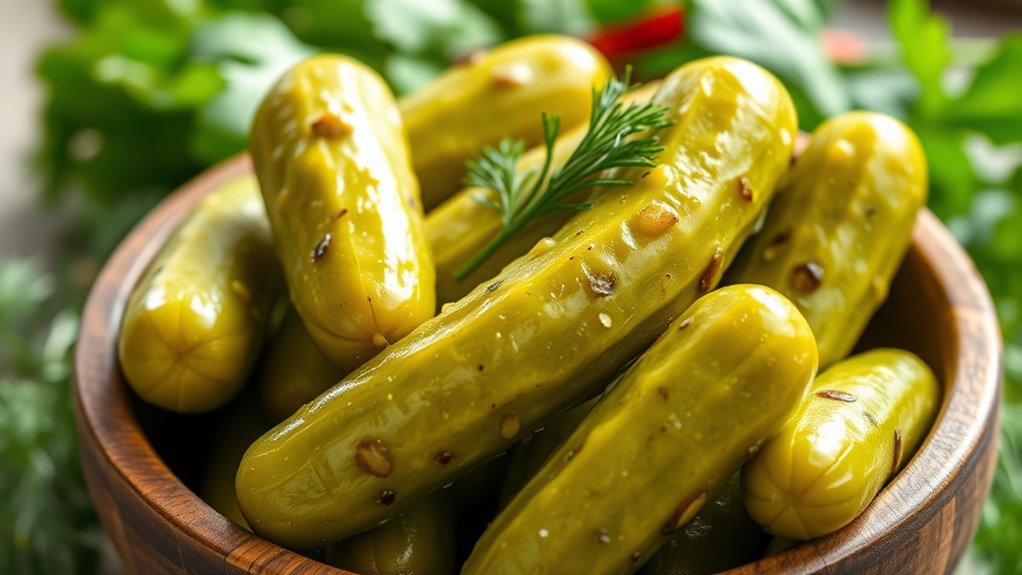Yes, pickles can be keto-safe when you choose the right varieties. Dill and kosher pickles are low in calories and carbohydrates, making them suitable for a ketogenic diet. Just be wary of pickles with added sugars, like bread-and-butter pickles, which can increase carb content. Opt for naturally fermented or vinegar-based pickles for added probiotics. Moderation is key, especially due to sodium levels. To learn more about incorporating pickles into your keto lifestyle and choosing the best options, keep exploring.
Understanding the Ketogenic Diet

The ketogenic diet, often referred to as keto, is a low-carbohydrate, high-fat eating plan designed to shift your body into a state of ketosis, where it burns fat for fuel instead of carbohydrates. Understanding keto principles is essential for anyone wanting to embrace this lifestyle. It typically involves significant dietary restrictions, limiting carbs to about 5-10% of your total caloric intake while increasing healthy fats to 70-75%. This shift can lead to various benefits, including weight loss and improved mental clarity. However, it’s important to contemplate how these restrictions might affect your overall nutrition and energy levels. Knowing what foods fit within the keto framework can empower you to make informed choices and maintain your freedom in selecting satisfying meals. Achieving success in this diet often requires proper carb counting to ensure you remain in ketosis.
Nutritional Profile of Pickles

Pickles can be a surprisingly versatile addition to a ketogenic diet, offering unique flavors and crunch without excessive carbs. Most pickle varieties, like dill and sour pickles, are low in calories and carbohydrates, making them a great snack or condiment. A typical serving contains about 1-2 grams of net carbs, allowing you to stay within your daily limits. Beyond their low carb content, pickles offer health benefits, including antioxidants and probiotics that can support gut health. However, it’s important to watch out for added sugars in some pickled products. By choosing naturally fermented or vinegar-based pickles, you can enjoy their crunchy goodness while reaping the nutritional rewards without derailing your ketogenic lifestyle. Additionally, the fermentation process enhances nutritional value and provides probiotic benefits that support gut health.
Types of Pickles and Their Ingredients

When considering pickles in a keto diet, it’s important to understand the different types and their ingredients. You’ll find varieties like dill, bread and butter, and sweet pickles, each with unique components that can affect their carb content. By comparing the nutrition facts, you can make informed choices that align with your dietary goals. Additionally, knowing the carb content of pickles can help you select the best options for your low-carb lifestyle.
Types of Pickles
Variety is key when it comes to pickles, as different types offer unique flavors and ingredients that can impact their compatibility with a keto diet. Here are three popular types of pickles you might consider:
- Dill Pickles: These are typically low in carbs and can complement your keto meals without much concern.
- Fermented Pickles: Rich in probiotics, they can aid digestion, but check for added sugars in some varieties.
- Bread and Butter Pickles: Often sweetened, these can be higher in carbs, so it’s best to avoid them on a strict keto plan. Additionally, considering the low carbohydrate content of dill and fermented pickles can help you stay within your keto goals.
Knowing the types of pickles and their carb counts helps you make informed choices while enjoying this crunchy treat on your keto journey.
Common Ingredients Used
Understanding the common ingredients used in pickles can help you navigate their suitability for a keto diet. Most pickles contain cucumbers, salt, vinegar, and various spices. The pickle brine composition often includes water, a vinegar base, and salt, which can vary by recipe. Dill pickle ingredients typically feature dill weed, garlic, and sometimes sugar or sweeteners, which may cause concern for those following keto. While traditional dill pickles are usually low in carbs, it’s essential to check labels for any added sugars or high-carb additives. By focusing on the ingredients, you can make informed choices that align with your dietary preferences, ensuring you enjoy pickles without compromising your keto goals. Additionally, being aware that olives are low in carbs can provide more options for maintaining a keto-friendly diet.
Nutrition Facts Comparison
While you might enjoy pickles as a crunchy snack or condiment, it’s crucial to compare the nutrition facts across different types to guarantee they fit your keto lifestyle. Here’s a quick nutritional comparison based on common pickle varieties:
- Dill Pickles: Typically low in calories and carbs, they often contain vinegar, salt, and spices, providing a satisfying crunch without impacting your macros considerably.
- Bread and Butter Pickles: These are sweeter due to added sugar, making them a less keto-friendly option, as they can contain higher carb counts.
- Kosher Pickles: Made with garlic and dill, they’re low in carbs and can be a great addition to your diet, thanks to their simple ingredient analysis.
Always check labels for added sugars and ingredients that might disrupt your keto journey. Additionally, incorporating low-carb options like pickles can help maintain your overall carb limits while adding flavor to your meals.
The Role of Vinegar in Pickling
When you think about pickling, vinegar plays an essential role in both flavor and preservation. It not only enhances taste but also offers health benefits, like supporting digestion and potentially stabilizing blood sugar levels. Understanding the different types of vinegar used in pickling can help you appreciate how they affect the overall profile of your pickles.
Benefits of Vinegar
Vinegar plays an essential role in the pickling process, not only enhancing flavor but also contributing to the preservation of vegetables. Its acidity helps inhibit the growth of harmful bacteria, making pickled foods safer to consume. Plus, vinegar offers several health benefits that you might find appealing. Here are a few:
- Weight Management: Vinegar may help you feel fuller, reducing overall calorie intake.
- Blood Sugar Regulation: Some studies suggest vinegar can improve insulin sensitivity, aiding in blood sugar control.
- Antioxidant Properties: Certain vinegar types contain antioxidants that can help combat oxidative stress in your body.
Incorporating vinegar in your pickles not only adds zest but also promotes your well-being, making it a smart addition to your keto-friendly diet.
Vinegar Types Explained
Choosing the right type of vinegar can greatly impact the flavor and preservation qualities of your pickles. There are several vinegar varieties to evaluate, each offering unique tastes and benefits. For instance, white vinegar is a popular choice for its sharpness and clarity, while apple cider vinegar adds a fruity depth. Rice vinegar is milder and perfect for Asian-style pickles, whereas balsamic vinegar can impart a rich sweetness.
The vinegar benefits extend beyond flavor; its acidity helps inhibit bacterial growth, ensuring your pickles stay safe and delicious. When selecting vinegar, think about the balance between taste and preservation. Experimenting with different vinegar varieties can lead to delightful discoveries in your pickling journey. Additionally, vinegar’s preservation qualities play a crucial role in maintaining the freshness and safety of your pickles.
Sugar Content in Pickles
Many people wonder about the sugar content in pickles, especially when trying to maintain a ketogenic diet. While traditional pickles can have some sugar, many brands utilize sugar alternatives to keep carb counts low. Here are a few key points to take into account:
- Fermentation Process: Naturally fermented pickles often have lower sugar levels due to the lactic acid produced, which can enhance flavor without added sugars.
- Types of Pickles: Bread-and-butter pickles typically contain more sugar compared to dill pickles, which are usually made with minimal or no sugar.
- Label Reading: Always check the nutrition label; some pickles might list added sugars or sweeteners that can affect your carb intake. Additionally, mustard varieties can also serve as low-carb condiments that complement pickles in a keto-friendly meal.
Sodium Levels in Pickles
While pickles can be a tasty addition to your keto diet, it’s important to evaluate their sodium levels. High sodium intake can lead to health implications such as increased blood pressure and fluid retention. However, moderation is key.
Here’s a quick comparison of sodium levels in different types of pickles:
| Type of Pickle | Sodium Content (mg) |
|---|---|
| Dill Pickles | 500 |
| Bread and Butter Pickles | 800 |
| Kosher Pickles | 600 |
Being mindful of your sodium intake helps you enjoy pickles without compromising your health. If you’re watching your sodium levels, consider serving pickles in moderation to maintain balance in your keto lifestyle.
Homemade vs. Store-Bought Pickles
When it comes to pickles, understanding the differences between homemade and store-bought options can greatly impact your keto diet. Here are some key points to evaluate:
- Homemade Benefits: You control the ingredients, avoiding added sugars and preservatives often found in store-bought varieties.
- Store-Bought Drawbacks: Many commercial pickles use high-fructose corn syrup and artificial flavors, which can sabotage your keto goals.
- Flavor Customization: Making pickles at home allows you to experiment with spices and flavors that suit your taste preferences. Additionally, low-carb alternatives are available for those looking to enjoy pickles while adhering to keto guidelines.
Potential Health Benefits of Pickles
Making your own pickles not only allows for ingredient control but also opens the door to various health benefits. One of the standout aspects of pickle health is their potential probiotic benefits. Fermented pickles are rich in beneficial bacteria that can support gut health, enhancing digestion and immunity. These probiotics can help balance your gut microbiome, which is vital for overall well-being. Additionally, pickles are low in calories and can satisfy cravings for something tangy and crunchy without derailing your dietary goals. Their high sodium content may raise concerns, but in moderation, they can be a flavorful addition to your meals. So, if you’re looking to enjoy health benefits while adhering to your dietary preferences, homemade pickles can be a smart choice.
How to Incorporate Pickles Into a Keto Diet
Incorporating pickles into your keto diet can be both enjoyable and beneficial, especially since they’re low in carbohydrates and can add a burst of flavor to your meals. Here are some simple ways to include them:
- Snacking: Enjoy pickles as a quick, low-carb snack. Pair them with cheese or nuts for added flavor and texture.
- Salads: Add chopped pickles to salads for a tangy twist. They work well with avocado, leafy greens, and olive oil dressings.
- Sandwiches and Wraps: Use pickles in your keto-friendly sandwiches and wraps. They provide crunch and flavor without the extra carbs.
Experiment with different pickle recipes and pickle pairings to find what you love most, making your keto journey delicious and satisfying!
Tips for Choosing Keto-Friendly Pickles
Choosing keto-friendly pickles can enhance your diet, provided you pay attention to a few key factors. First, check the label for added sugars; opt for brands that use natural pickling techniques, which often involve vinegar, salt, and spices without sweeteners. Look for options that are low in carbohydrates—ideally under 1 gram per serving. You’ll also find a variety of flavor variations, from dill to garlic or even spicy options, allowing you to enjoy different tastes while staying on track. Finally, consider homemade pickles, where you control the ingredients and flavors, ensuring they fit your keto lifestyle perfectly. By being mindful of these aspects, you can savor pickles without compromising your health goals.
Frequently Asked Questions
Can Pickles Help With Keto Cravings?
Absolutely, pickles can be your secret weapon against keto cravings! These crunchy delights aren’t just a tangy snack; they’re packed with pickle benefits that keep your taste buds satisfied without derailing your diet. When you’re feeling snacky, grab a dill or a sour pickle—they’re low in carbs and calories. Plus, their bold flavor can curb those pesky cravings, making them a fantastic keto snack. Enjoy the freedom of flavor while staying on track!
Are Fermented Pickles Better for Keto?
Fermented pickles can be a better choice for keto enthusiasts. They offer fermented benefits, which include enhanced nutrient absorption and improved gut health. The probiotic properties found in these pickles can support digestion, making them a fantastic addition to your low-carb meals. Just be cautious with the sodium content; moderation is key. Overall, incorporating fermented pickles into your diet not only aligns with keto goals but also promotes overall well-being. Enjoy the freedom they bring!
How Many Pickles Can I Eat on Keto?
You can enjoy pickles in moderation on keto, as they’re low in carbs. Typically, you’re looking at around 1-2 whole pickles or a few slices, depending on the variety. Pickle nutrition offers beneficial probiotics, especially in fermented types, which can aid digestion. Just keep an eye on added sugars in some brands. Embracing pickles in your diet can enhance your keto experience while giving you the freedom to enjoy diverse flavors!
Do Pickles Break a Fast on Keto?
No, pickles typically don’t break a fast, especially if you choose low-calorie types like dill or sour pickles. They can even enhance fasting benefits by providing electrolytes. However, be cautious of sweet pickles, as they contain sugar that could disrupt your fast. Enjoying pickles while fasting might help you feel satisfied and less tempted to break your fast, keeping you on track with your keto journey while enjoying some freedom in your choices.
Can Pickles Cause Bloating on a Keto Diet?
Yes, pickles can cause bloating on a keto diet for some people. The high sodium content might lead to water retention, a common bloating cause. Additionally, certain ingredients in pickles, like vinegar or spices, can affect keto digestion for sensitive individuals. But don’t worry—this doesn’t happen to everyone. If you’re enjoying pickles and feeling fine, keep them in your diet. Just be mindful of how your body reacts!
References
- https://www.healthline.com/nutrition/keto-pickles
- https://www.verywellfit.com/are-pickles-keto-5117192
- https://www.ncbi.nlm.nih.gov/pmc/articles/PMC6313445/
- https://www.webmd.com/diet/obesity/ss/slideshow-keto-diet
- https://www.dietdoctor.com/low-carb/keto/pickles
- https://www.goodhousekeeping.com/health/diet-nutrition/a25118364/keto-diet-foods/


